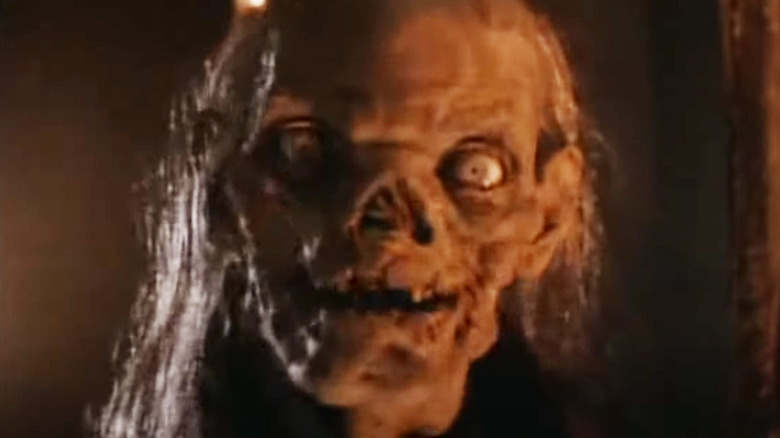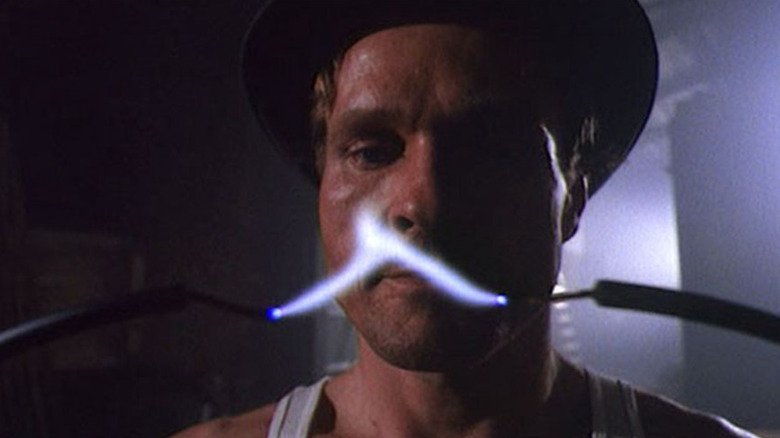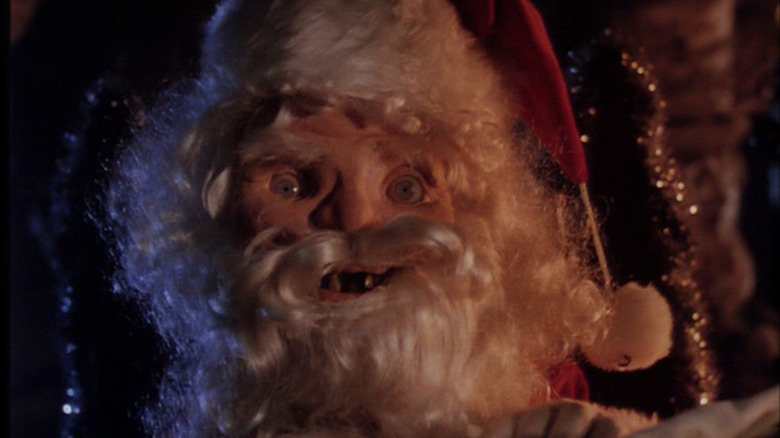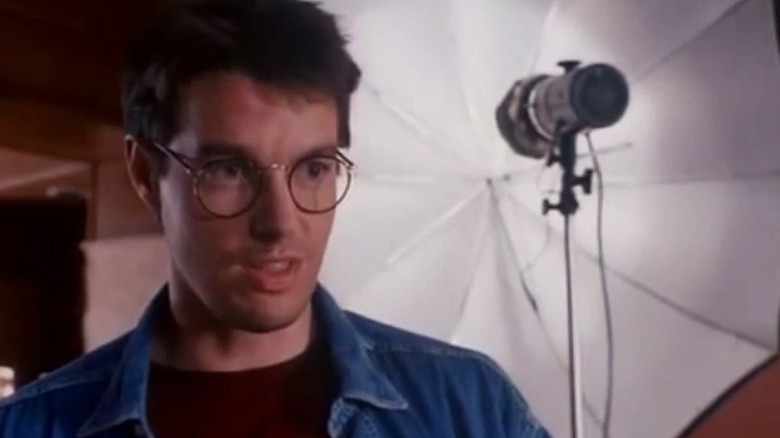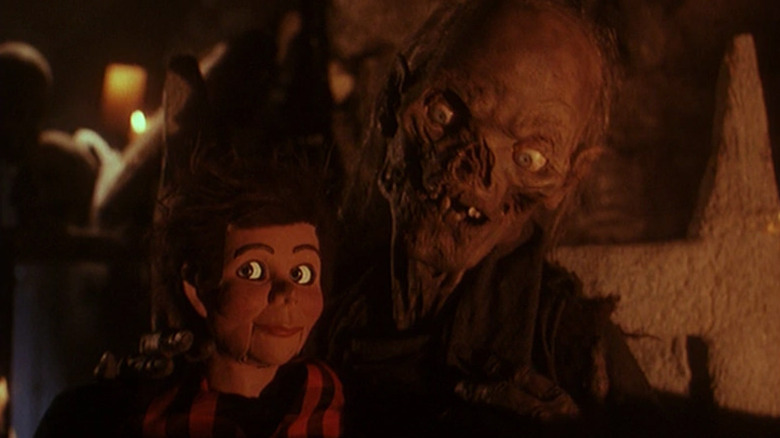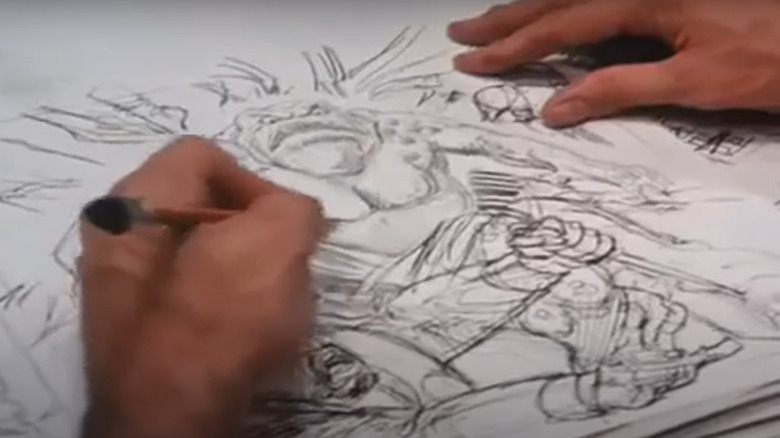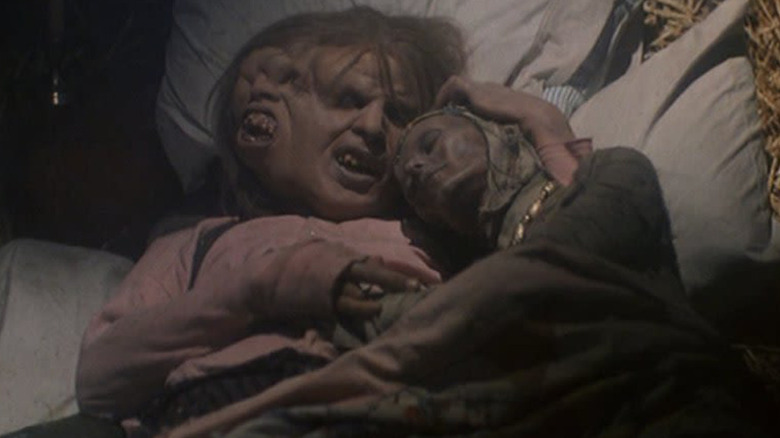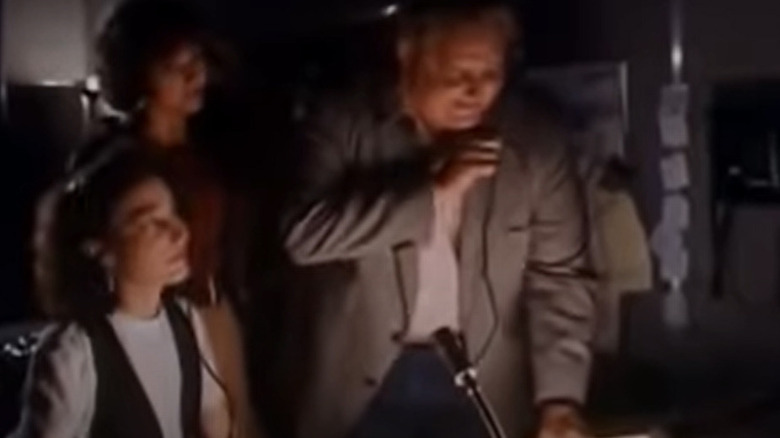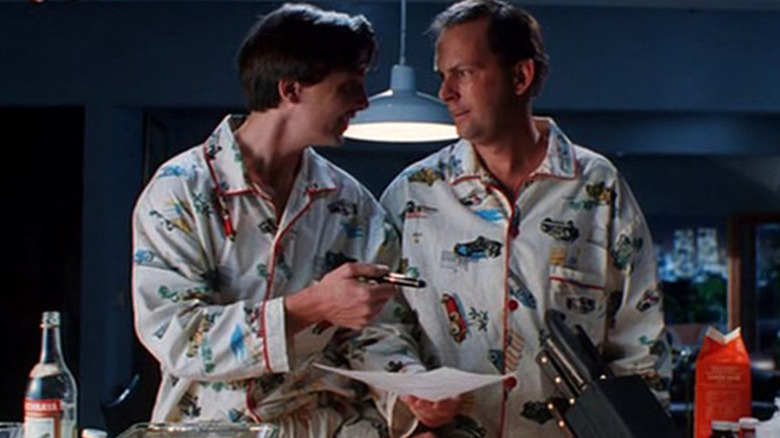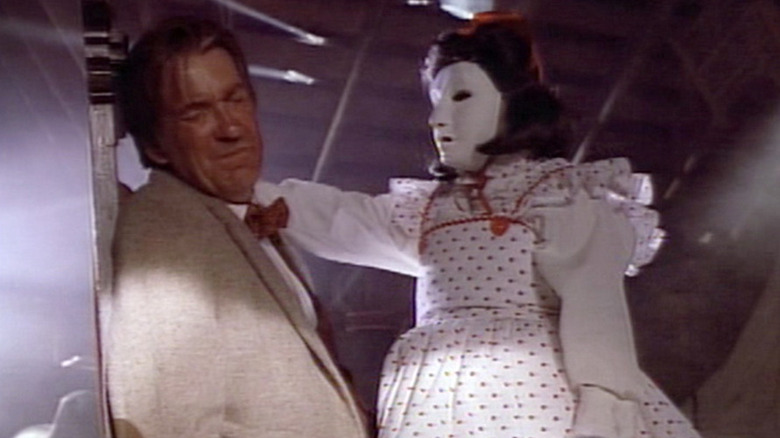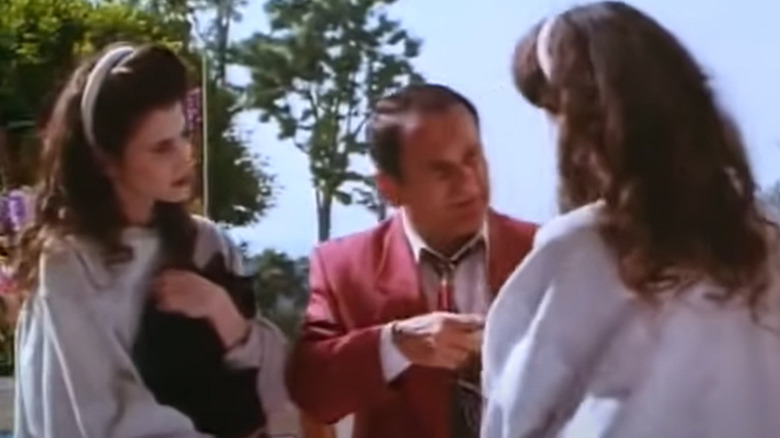Best Episodes Of Tales From The Crypt
In the '90s, there was no better source for gruesome fun and disturbing delight than "Tales from the Crypt." This series sourced most of its offerings from EC Comics' infamously eerie titles, such as "Shock SuspenStories" and "The Vault of Horror." Virtually outlawed in their time for just how trashy and violent they were (via The New York Times), these stories are hailed today as comic book classics.
Many of EC Comics' most beloved stories feature cruel people receiving some form of gruesome comeuppance. The show takes these tales and adds campy performances and top-tier (if sometimes cheesy) special effects. No two episodes are alike, and over the course of seven seasons, this scary (and bingeworthy) show covers everything from the undead to vampires to serial killers to haunted houses. It truly has something for everyone, whether you're looking for subtle suspense or sickening violence. Plus, as this show aired on HBO, it really cuts loose when it comes to the latter category.
With over 90 episodes to its name, "Tales from the Crypt" offers many hours of high-quality horror entertainment. But which installments stand above the rest? These are the very best "Tales from the Crypt" episodes, from nightmares involving spooky children to gory tales of revenge.
The Man Who Was Death (Season 1, Episode 1)
"Tales from the Crypt" hits the ground running in its very first episode with this macabre noir story. Niles Talbot (William Sadler) has recently been promoted to resident executioner of his prison. Operating the electric chair is undoubtedly gruesome work, but it's work that Talbot enjoys ... perhaps a bit too much. Things change when the state outlaws the death penalty, and soon enough, Talbot receives his pink slip. With his line of work taken from him, Talbot becomes a ruthless nighttime vigilante, executing criminals who got off easy.
This inaugural outing definitely sets a macabre tone for the rest of the series. It also perfectly represents the show's roots in pulpy comic books through dramatic staging and shadowy cinematography. William Sadler, who you may recall as Heywood in "The Shawshank Redemption" or Death in "Bill and Ted's Bogus Journey," is definitely the episode's greatest strength: He brings an unorthodox charm to the role, injecting it with equal amounts of likability and darkness. It's disturbing to see just how much he likes his bloodthirsty job, and how thoroughly he works to justify his murderous activities. This is a quaint episode when compared to later seasons, but it's a definite stand-out in terms of style and lead performance.
And All Through the House (Season 1, Episode 2)
The "killer Santa Claus" trope is common in horror films, the most famous example likely being 1984's "Silent Night, Deadly Night." Despite its short length, this festive episode from Season 1 is a solid addition to the sub-genre.
Elizabeth (Mary Ellen Trainor) is a cheating housewife who kills her husband for the insurance money on Christmas Eve. But before she can dispose of the body, she is attacked by an escaped mental patient dressed as Santa Claus! Robert Zemeckis' impeccable direction elevates this cliché so completely, this episode stands out as one of the show's best. Though it's one of the show's few ventures into slasher horror, it hits all the right notes. It's also effectively scored, and successfully builds up to several strong jump scares through well-paced suspense. Despite having barely any dialogue, Larry Drake manages to steal the show as the disturbed Santa Claus. It's a yuletide tale chock-full of legitimate terror that only "Tales from the Crypt" could provide.
The Thing from the Grave (Season 2, Episode 6)
Despite its episodes' brief runtimes, "Tales from the Crypt" gets viewers deeply invested in its characters. In "The Thing from the Grave," we meet Devlin (Kyle Secor), a photographer who has found himself working a shoot with a beautiful centerfold named Stacy (Teri Hatcher). The two immediately show interest in each other, a fact that doesn't go unnoticed by Stacy's fiancé and manager Bruckner (Miguel Ferrer). Devlin quickly becomes Stacy's shoulder to cry on, and as their romance blooms, he gives her a special necklace. He says the necklace keeps the promise of whoever holds it — quite fitting, as he promises to protect her from Bruckner. This soon becomes impossible as the jealous Bruckner catches onto their romance, shoots Devlin, and kidnaps Stacy. However, Devlin's words about the necklace prove to be true in a way no one could have ever expected.
This episode's tone and direction perfectly replicate the lurid, gut-punch feeling of an early "Tales from the Crypt" comic book. It also contains a genuinely charming romance, counterbalanced with a fittingly supernatural twist and a great just-desserts style ending.
The Ventriloquist's Dummy (Season 2, Episode 10)
Many "Tales From The Crypt" episodes build up to a major pay-off. "The Ventriloquist's Dummy" is an absolute doozy in this department. Billy Goldman (Bobcat Goldthwait), an amateur ventriloquist, tracks down his inspiration, Mr. Ingels (Don Rickles), for puppeteering pointers. At one time, Ingels was very famous for his ventriloquist act, which featured his comical dummy, Morty. However, tragic events seem to follow Ingels wherever he goes, which Billy eventually confronts him about. Ingels then reveals the terrible secret of his act. As Billy learns, you really shouldn't meet your heroes.
Morty is most definitely the highlight of the episode — the puppet's design is equal parts disturbing and hilarious. But the humans in this episode are definitely no slouches: Under the assured direction of the legendary Richard Donner, both Rickles and Goldthwait deliver great performances. This is a darkly funny look at the price of fame in the entertainment world you're not likely to forget any time soon.
Korman's Kalamity (Season 2, Episode 13)
In this delightfully self-aware outing, we meet Jim Korman (Harry Anderson), a struggling artist on the "Tales from the Crypt" comic book. Aside from artistic burnout, Jim is also suffering through life with a wife who treats him like dirt. Things get even worse when the pills Jim takes turn out to have a curious side effect: Everything he draws seems to be leaping off the page and causing trouble in the real world. This catches the attention of a police officer named Lorelei (Cynthia Gibb), who the love-starved Jim quickly becomes smitten with.
This is a "Tales from the Crypt" episode that definitely leans into the zanier side of things. This is helped along by Harry Anderson's impeccable comedic timing, as well as strong performances from the supporting cast. In its cartoonish creativity, "Korman's Kalamity" feels like an R-rated "Goosebumps" episode. The fact that Jim's creations truly seem like they've been ripped out of the pages of an old-school comic book cements this success. Plus, the entire premise is a wonderful way to pay tribute to the show's printed predecessor.
Lower Berth (Season 2, Episode 14)
In this circus-centered terror tale, we're introduced to a romance that only "Tales from the Crypt" could provide. Enoch (Jeff Yagher), a horribly disfigured man with two faces, is stuck serving as a star attraction of a traveling freak show. Aside from being heckled by onlookers, Enoch is subjected to various abuses from his cruel caretaker, Mr. Sickles (Stefan Gierasch). Sickles has hidden Enoch's failing health from the show's promoter, Mr. Feeley, for quite some time, but the jig eventually comes up.
Meanwhile, the show comes into possession of the mummified remains of an Egyptian slave girl, nicknamed Myrna. It's foretold that anyone who attempts to abscond with her precious jewels will lose their own. Enoch is smitten with Myrna, and doesn't take kindly to Sickles' treatment of her body. This results in Sickles' death and the star-crossed lovers escaping into the night.
This episode's unique setting gives it one-of-a-kind flavor, which suits its unforgettable romance to a T. It also gives the Cryptkeeper himself the fittingly bizarre backstory he deserves.
Television Terror (Season 2, Episode 16)
"Tales from the Crypt" visits a number of haunted houses throughout its run, but this is definitely the strongest of those outings. Horton Rivers (Morton Downey Jr.), a TV shock journalist, is looking to give his ratings a boost. Thus, he takes his crew, whom he frequently mistreats, to a supposedly haunted house in Los Angeles. Once they're inside, however, it doesn't take too long for the cynical Rivers to become a believer in the supernatural. Trapped in the house, Rivers and the crew are subjected to terror after terror, as the ratings take off.
The key to any great haunted house story is the build-up and eventual reveal of the supernatural threat. This episode doesn't waste any time getting started on this process once the crew is inside the house. All the best tropes are used here, from moving furniture to bloody specters to disturbingly gruesome apparitions. Additionally, we get to see moments of horror shown through characters' in-universe cameras, which heightens the tension of the entire experience. This could definitely be considered an early example of found footage horror. All in all, this is an eerily excellent episode that proves trying to make it big on television can really be murder.
My Brother's Keeper (Season 2, Episode 17)
Conjoined brothers Eddie (Jonathan Stark) and Frank (Timothy Stack) are literally joined at the hip. Unfortunately, they're also polar opposites. Desperate for a way out of their shared situation, the duo finds an eccentric surgeon who might be able to separate them. However, after hearing about the surgery's 50% success rate, Frank refuses to sign his name alongside Eddie's. With freedom nearly in his grasp, Eddie begins making Frank's life unbearable, to the point of sabotaging Frank's burgeoning romantic relationship. It builds to a dark and humorous conclusion, in which Eddie learns that you should be careful what you wish for.
The joy of this episode comes from watching the brothers argue and seeing what despicable lengths Eddie will go to in his quest for autonomy. The comedic and dramatic chemistry between the brothers is impeccable — both actors are at the top of their game here. "Tales from the Crypt" is at its strongest when balancing the comical and the macabre, and this episode serves as a great example of why.
Carrion Death (Season 3, Episode 2)
Sometimes, the simplest premises are the most effective. "Carrion Death" is definite proof of that. Conflicted felon Earl Raymond Diggs (Kyle MacLachlan) escapes from jail and makes a break for the Mexican border. Unfortunately, he has a tenacious state trooper hot on his tail, who chases him into the Arizona desert. Diggs manages to kill the trooper, but is handcuffed to the dead body with no access to the key. He is forced to drag the body across the blisteringly hot desert with no water, food, or means of survival. As he suffers in the sun, a pack of buzzards looms ever closer to their next potential meal.
Horror doesn't necessarily need to be overblown, grotesque, or spectacular — sometimes, less is definitely more. This installment is fantastic proof of that axiom: It's half desert survival story, half crime thriller, served with zero fluff. In getting right to the point, it enhances its nightmarish potency, eventually reaching a conclusion that is among the show's best.
The New Arrival (Season 4, Episode 7)
Dr. Alan Goetz (David Warner) is a struggling radio psychologist who deals primarily with issues involving young children. His ratings have been in sharp decline for some time, and if he can't turn things around, his show will be canceled. In a desperate move, he decides to provide a house call to a frequent caller named Nora (Zelda Rubinstein). Goetz brings his crew along to meet Nora and deal with her misbehaving daughter, Felicity. Things become unsettling the moment they arrive, as Felicity's horrific screams can be heard from outside the house. We are then formally introduced to this problem child, who wears a mysterious porcelain mask. Felicity isn't just a bratty tyke — she's something entirely more terrifying.
This episode is deeply unsettling, with every successive moment increasing the ambient sense of unease. Felicity's violent acts and Zelda Rubinstein's powerfully creepy performance are the key to this nightmare. Family horror, spooky kids, and "Saw"-like traps all combine to make "The New Arrival" a top-tier installment.
Split Personality (Season 4, Episode 11)
This episode proves that most productions, be they film or television, are made exponentially better by Joe Pesci's presence. Here, Pesci plays to his strengths as Vic, a smooth-talking con man always on the lookout for his next big score. That score turns out to be two twin sisters who have recently inherited a massive fortune from their deceased father. Charming both of the twins proves to be a cakewalk for this master manipulator.
Soon enough, however, Vic determines that marrying one of them will only get him half of their fortune. Lying right through his teeth, he cons the duo into believing that he too has a twin brother. He proceeds to utilize two personas to lead both women to the altar and seemingly pull off the ultimate score. But things take a turn for the disturbing when he and the twins realize things aren't quite as they appear.
The premise of "Split Personality" is one of the strongest in the show, and Pesci further elevates it through unbridled charisma. Though it only becomes a true horror story in its finale, said ending contains one of the show's most memorable visuals.
